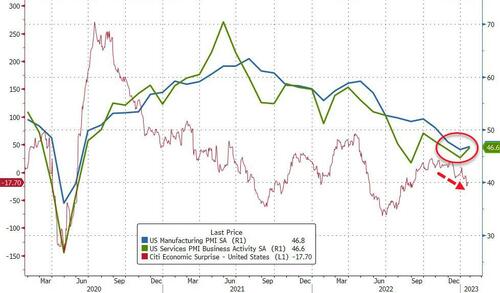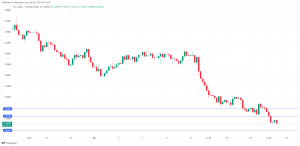Economics
US PMIs Decline “Among The Steepest Since The Global Financial Crisis” In January
US PMIs Decline "Among The Steepest Since The Global Financial Crisis" In January
The preliminary US PMI data was slightly better than expected…

US PMIs Decline “Among The Steepest Since The Global Financial Crisis” In January
The preliminary US PMI data was slightly better than expected but remains in contraction:
-
S&P Global US Manufacturing PMI (January Flash) 46.8 vs 46.0 exp vs 46.2 prior – 7th monthly print below 50
-
S&P Global US Services PMI (January Flash) 46.6 vs 45.0 exp vs 44.7 prior – 3rd monthly print below 50
Both remain below 50 (i.e. in contraction)
Source: Bloomberg
The headline Flash US PMI Composite Output Index registered 46.6 in January, up from 45.0 at the end of 2022.
The contraction in activity was solid overall, but the slowest since last October. Goods producers and service providers recorded similar rates of decline, with service sector firms indicating a notable slowdown in the pace of decrease since December. Nonetheless, companies continued to highlight subdued customer demand and the impact of high inflation on client spending.
Not a good sign for US economic growth…
Commenting on the US flash PMI data, Chris Williamson, Chief Business Economist at S&P Global Market Intelligence said:
“The US economy has started 2023 on a disappointingly soft note, with business activity contracting sharply again in January. Although moderating compared to December, the rate of decline is among the steepest seen since the global financial crisis, reflecting falling activity across both manufacturing and services.
“Jobs growth has also cooled, with January seeing a far weaker increase in payroll numbers than evident throughout much of last year, reflecting a hesitancy to expand capacity in the face of uncertain trading conditions in the months ahead. Although the survey saw a moderation in the rate of order book losses and an encouraging upturn in business sentiment, the overall level of confidence remains subdued by historical standards. Companies cite concerns over the ongoing impact of high prices and rising interest rates, as well as lingering worries over supply and labor shortages.
Europe and Japan saw their Composite PMIs rise back into ‘expansion’ territory overnight (over 50 barely) but, while the US Composite inched higher, it remains the worst-performer among the global major economies and still in contraction (below 50).
Finally, Williamson points out a more problematic theme: “the worry is that, not only has the survey indicated a downturn in economic activity at the start of the year, but the rate of input cost inflation has accelerated into the new year, linked in part to upward wage pressures, which could encourage a further aggressive tightening of Fed policy despite rising recession risks.”
Stagflation to start the new year?!
Not exactly what stocks are pricing in…
Seems like the only hope is that The Fed folds first… because ‘soft landing’ this is not!
Tyler Durden
Tue, 01/24/2023 – 09:56
inflation
stagflation
policy
interest rates
fed

Argentina Is One of the Most Regulated Countries in the World
In the coming days and weeks, we can expect further, far‐reaching reform proposals that will go through the Argentine congress.
Crypto, Crude, & Crap Stocks Rally As Yield Curve Steepens, Rate-Cut Hopes Soar
Crypto, Crude, & Crap Stocks Rally As Yield Curve Steepens, Rate-Cut Hopes Soar
A weird week of macro data – strong jobless claims but…
Fed Pivot: A Blend of Confidence and Folly
Fed Pivot: Charting a New Course in Economic Strategy Dec 22, 2023 Introduction In the dynamic world of economics, the Federal Reserve, the central bank…























